View and obtain free Missouri divorce records via the guidance this resource offers.
A divorce record is a formal document signaling the termination of a marriage. It carries crucial data that recognizes both individuals involved in the split, along with important specifics such as the time and location of when the divorce was finalized.
The record includes all documents related to the case from its inception to its end, but the key for searchers is to know how to find them. Obtaining these divorce records is often free, but certified records or copies may require a nominal fee.
Discover how to track down and review divorce and dissolution of marriage information on anyone in Missouri using this streamlined guide.
Are Divorce Records in Missouri Accessible to Anybody?
Divorce records in Missouri are considered public records. Any person can view these records as highlighted by the Mo. Rev. Stat.§ 610.010.6(6).1
However, not all divorce cases are open to the public for viewing. Certain circumstances require some documents to be kept private or sealed off from the public eye and these include:
1) When either party requests that specific information be sealed.
2) Information about minors and juveniles involved in any way.
3) Confidential data related to assault victims, especially domestic violence sufferers.
4) Personal financial data of anyone who is directly tied up with the case.
It’s also important to note that certified copies of these vital records are also not handed out to everyone—only those individuals who are directly involved in the divorce process can acquire confidential copies. However, citizens can procure non-verified copies through third-party sources.
When it comes to divorce rates, data from all over the U.S. in 2021 highlights that in Missouri marriage dissolution occurs at a rate of 2.9 per 1,000 individuals.
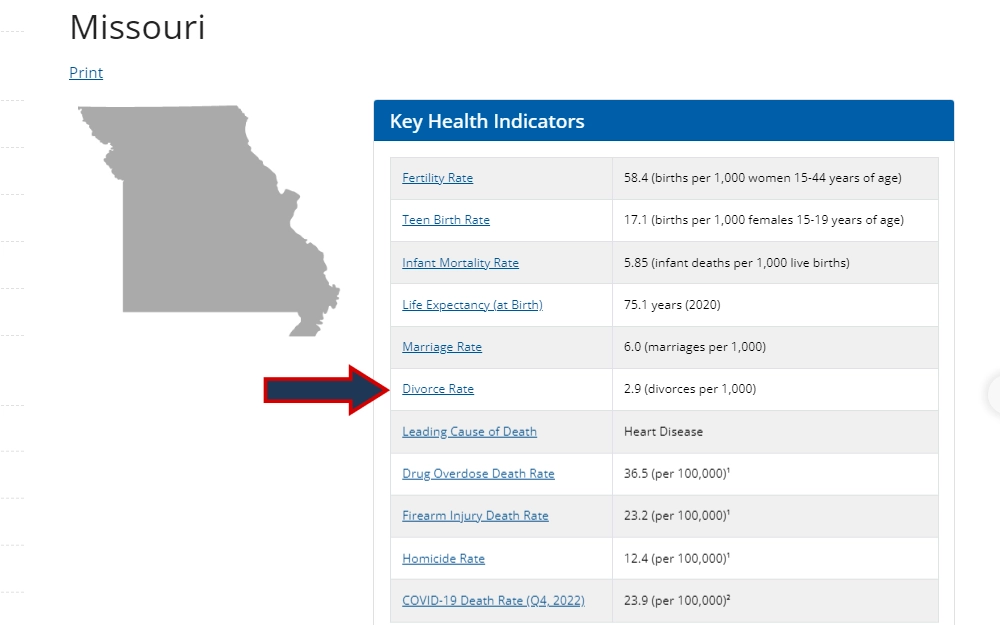
How To Look Up Missouri Divorce Records
To access divorce records in Missouri, inquirers need to get in contact with the Bureau of Vital Records under the state’s Department of Health and Senior Services (DHSS). The first step involves filling out the Application for a Vital Record form.
This has to be submitted to the DHSS. These requests do require certain fees, including a search fee, which covers five years’ worth of record inspections, at $15 per record. For additional sets of five-year searches, an extra cost comes into play.
All payments must be made payable through check or money order only. There are three ways inquirers can submit their request: in person, by mail, and online.
If choosing an in-person approach, record seekers must first call the Bureau’s office in Jefferson City at 573-751-6387 and make an appointment. The appointments are scheduled from around 10 am – 3 pm on weekdays. The Bureau can be reached at the following address:
Bureau of Vital Records
Jefferson City Vital Record Lobby
930 Wildwood Dr.,
Jefferson City, MO 65109
Individuals can choose to mail their application as well. This requires them to include all of the necessary documents, including the application form, a self-addressed stamped envelope, and a money order or a check.
All of these documents are to be mailed to the following address:
Department of Health & Senior Services
Bureau of Vital Records
930 Wildwood Drive
Jefferson City, Missouri 65109
In case online methods are preferred, then the state has outsourced these services to third-party service providers such as VitalChek. They allow ordering via phone at +1-877-817-7363 or directly through their website but note that they levy an additional charge for their service.
Obtaining Divorce Information in Missouri via County & City Agencies
The Bureau of Vital Records provides the broadest state-level search for finding divorce records. However, interested individuals can narrow down their search by finding the relevant offices in their counties that might hold these records.
A few examples of how to track down these documents through both counties and cities are outlined below.
St. Louis County: To find divorce records, requesters need to get in contact with the St. Louis Circuit Clerk’s Office.3
However, to get these records, certain details like the full names of both parties and when they got divorced are to be disclosed first.
These records can be obtained through different ways, such as physically visiting the office or using the VitalChek platform provided by the State of Missouri Department of Health & Senior Services. The office can be visited at the following address:
St. Louis County Circuit Clerk’s Office
Civil Courts Building
10 North Tucker Boulevard
St. Louis, MO 63101
Phone: (314)613-7192
Same-day copies can be obtained for just $0.30 per page if opting for a personal visit option; otherwise, there is an option available to receive them via mail with around a two-week waiting time period. All the documents could be mailed to the following address:
St. Louis County Circuit Clerk’s Office
P.O. Box 16998
Clayton, MO 63105
When it comes to payment options, requesters could either pay by mail through check or money order payable to the St. Louis County Circuit Clerk or simply pay cash during the visit in person at their cashier desk.
Obtaining certified copies involves some additional steps though – namely mentioning the case number, names of the parties involved, identification documents, and the title of the document along with other details. Authentication costs around $1.50 – $3.50.
Jackson County: Jackson County divorce records can be obtained from the office of the County Clerk. For successful retrieval, citizens must provide information relating to both parties, including their names and date of divorce. Inquirers may send an email at [email protected], send mail requests, or visit the office of the County Clerk at the following address to inquire about the records:
Jackson County Clerk’s Office
415 East 12th St.
Kansas City, MO 64106
Phone: (816)881-3242
Monday – Friday (8 am – 4:30 pm)
Another way of obtaining records is through the Missouri Courts Unified Search Tool, which can be utilized for free public divorce records search. Record seekers must first choose Jackson County from the available options list when starting their search.
Then they are required to choose the option of ‘Family/Domestic’ from the menu provided. At this point, applicable information such as the names of the divorced couple and the filing year is to be provided in relevant boxes. This will narrow down the search to only divorce indexes.
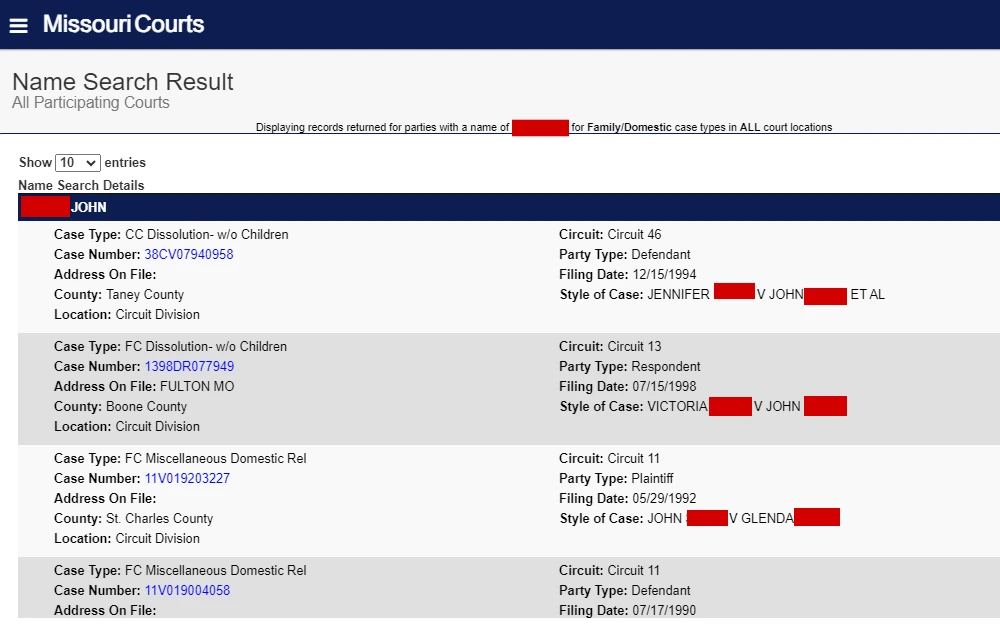
Next, interested individuals should look for either ‘divorce’ or ‘dissolution’ phrases in the court files. Once these have been found, there will be a case number associated with the files. Click on it, as this will unveil detailed facts about the chosen case that cover entire descriptions related to divorces recorded therein.
St. Charles County: Divorce records in St. Charles County are kept by the Circuit Clerk.5 Contacting the office of the Circuit Clerk directly can help secure copies of divorce decrees or judgments. The office can be reached at the following address:
Office of the Circuit Clerk
300 North Second Street, Suite 217
St. Charles, MO 63301
Phone: (636)949-3080
Divorce records can also be viewed online through the Missouri Case Portal. However, there is a 25 cents per page fee associated with getting a copy of the court records. To acquire certified copies, individuals are required to pay an extra $1.50.
You can also check out the tutorial on accessing Clay County divorce details or refer to the steps for obtaining Greene County dissolution records for additional insight or examples.
Kansas City: The rules set by the Missouri Supreme Court and the Sunshine Law govern the process of acquiring municipal court records in Kansas City.
Record seekers interested in acquiring divorce certificates or records of Kansas City need to first download and fill out the Public Records request form. This completed form should then be sent by email to [email protected].
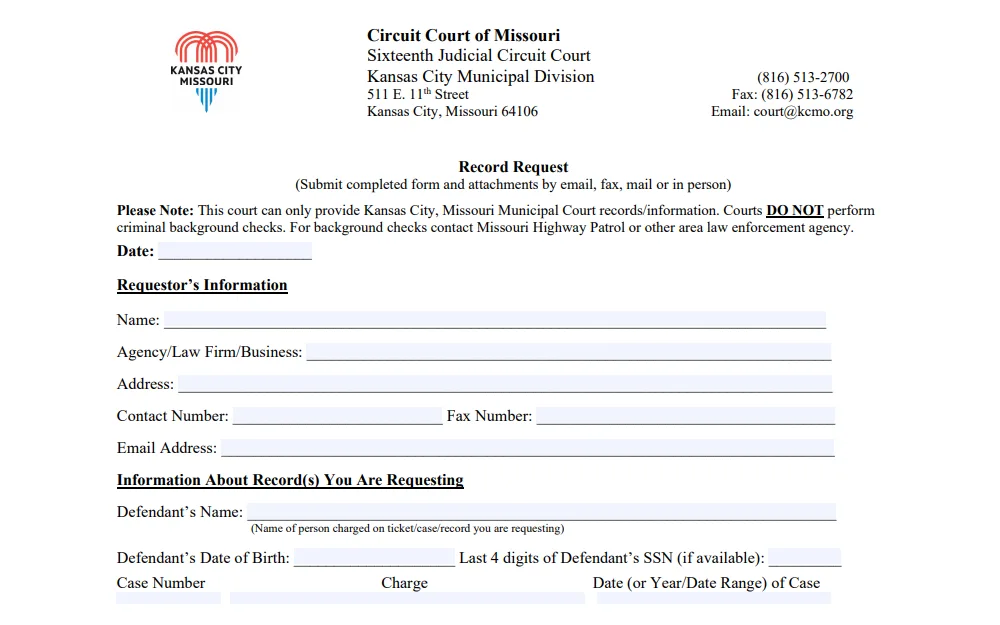
The city authorities ask for three business days to respond to these requests. Citizens must also ensure that all details about the records being requested have been included before sending the form. A filled-out request form can also be mailed or faxed at the following:
Circuit Court of Missouri
511 East, 11th Street
Kansas City, MO 64106
Phone: 816-513-2700
Fax: 816-513-6782
While a response will arrive within three business days, receiving actual records takes a bit longer than that. For the payment, Municipal Court charges $1.50 for copies of the first page, followed by 10¢ for additional pages and $2 per case if certification is needed.
St. Louis City: In the City of St. Louis, divorce records are kept by the Circuit Clerk’s Office. Interested individuals can get certified copies of these records from the office’s location:
St. Louis County Circuit Clerk’s Office
Civil Courts Building
10 North Tucker Boulevard
St. Louis, MO 63101
Phone: (314)613-7192
Inquirers can also head over directly to see the Circuit Clerk File Room on level three at the Civil Courts Building between 9 a.m. and 5 p.m. on weekdays and request access to the records. Interested individuals also have another option to access uncertified versions of these records.
The State of Missouri Department of Health & Senior Services has a third-party regulated online VitalChek search tool that can help in accessing divorce records.7
However, to view the Missouri divorce records, individuals must provide comprehensive information about parties involved in the process, such as full names and the date when it was finalized.
Springfield City: The Greene County Circuit Clerk’s office is responsible for maintaining the divorce records across the county, including for Springfield City. The process begins with getting and filling out a Public Request Form.8
The form needs to be filled with basic details like the requester’s name, address, email, and phone number, as well as information regarding the type of record they are searching for. The form can then be emailed to [email protected] or mailed directly to the following address:
Greene County Circuit Clerk’s Office
1010 North. Boonville Avenue,
Springfield, MO 65802
Phone: (417)868-4074
Requesting these official documents does come with certain costs. For acquiring copies, $0.25 per page is charged, although these charges can increase. If opting for certified copies expect to pay $3 for the document and $6.0 for authentication.
For getting the records through mail $1 is also charged additionally. The state, county, and city-level searches provide records that may not be valuable for genealogical research. As such, researchers who are interested in finding older records for genealogy or research purposes can contact the Missouri State Archives and request older records.
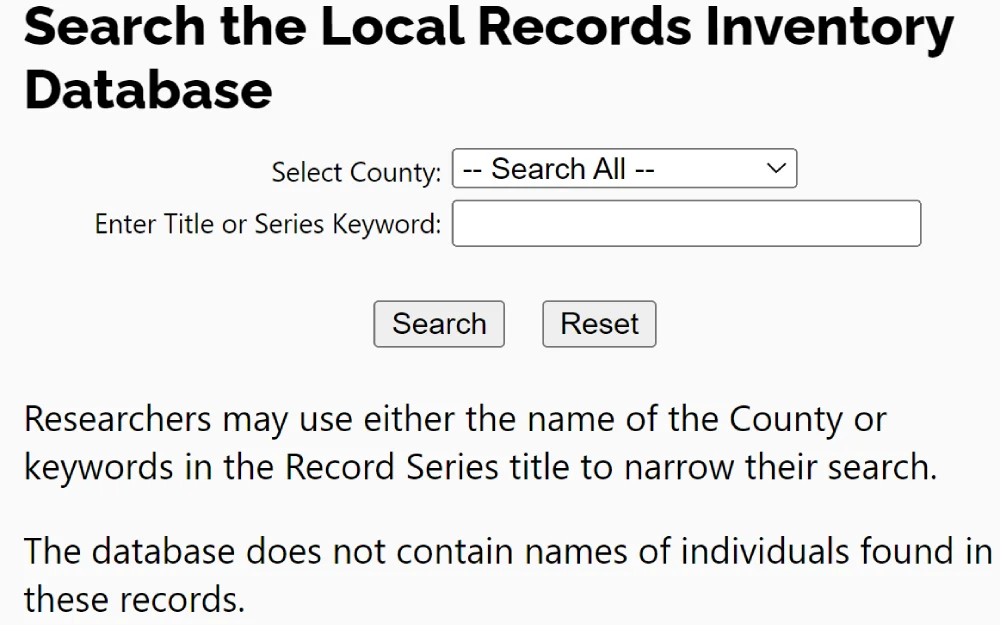
This will be explained more in depth in the following section.
Viewing Historical Divorce Records Through the Missouri State Archives
The Missouri State Archives came into being in 1965. It comes under the Secretary of State’s office, sharing that space with the state’s library. The Missouri State Archives provides archived records for research purposes.
People can find records about births, marriages, deaths, and divorces. They even have a special collection geared towards genealogy, which houses marriage and divorce documents.
For searching records, including divorce records, the state archives provide an online research request form where individuals can ask for public records. However, they must first create an account before requesting a record search.
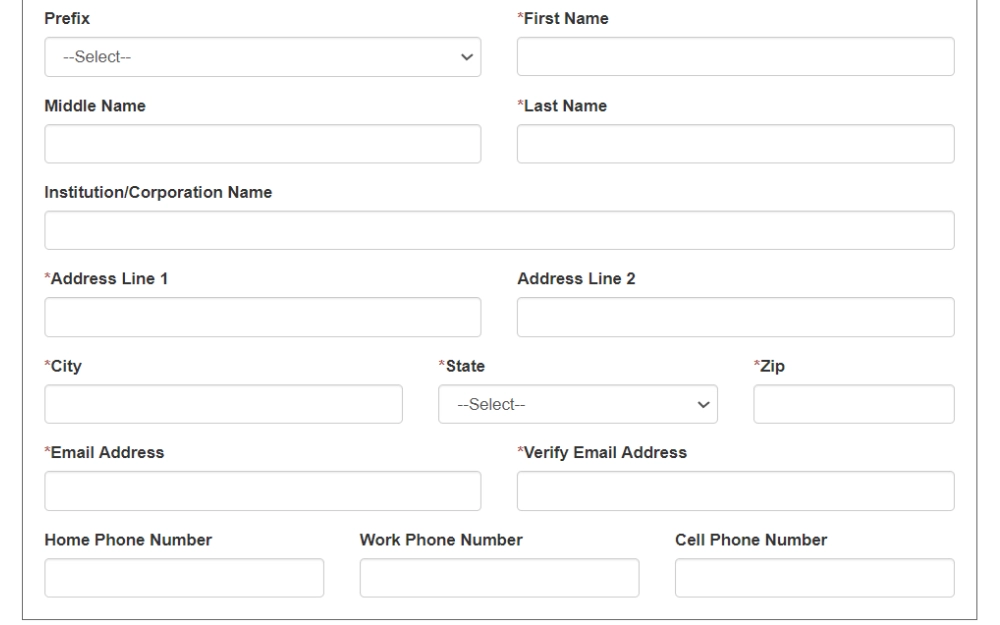
The archives also provide a Genealogical Request Form, which needs to be filled out. Record seekers should provide the full name of the person whose record they are requesting. In cases of divorce records, both names should be given if possible.
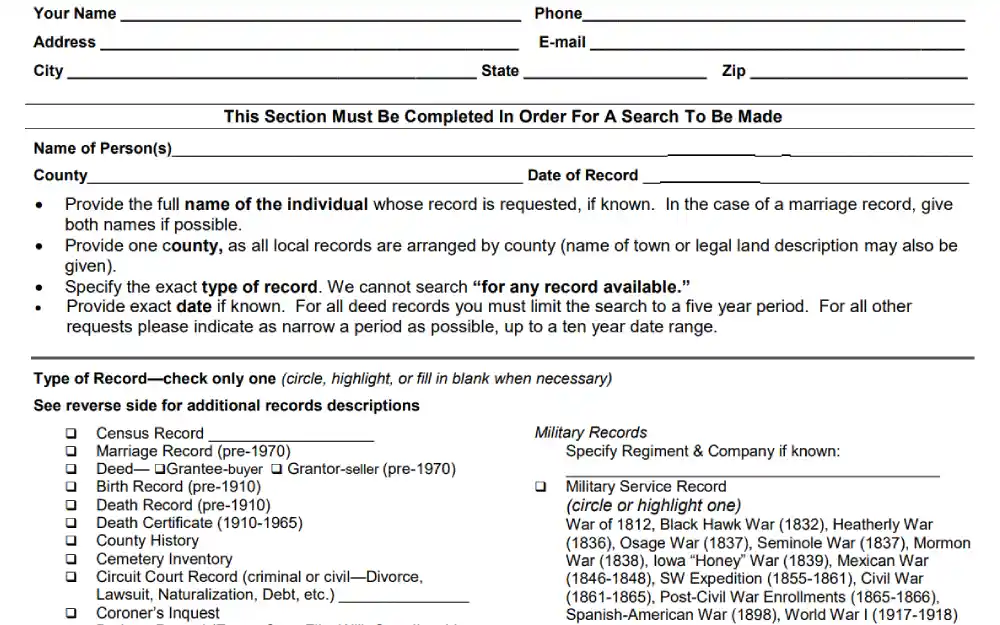
Knowing that all local records are arranged by county can help narrow down the search. Details such as town names or land descriptions could also prove useful. Defining what type of record is necessary, as it will refine the search results further while providing an exact date the divorce was finalized (if known) narrows down the search even more.
Once the form has been completed, it could be mailed to the following address:
Office of the Secretary of State
600 West Main
P.O. Box 1747
Jefferson City, MO 65102
Payment for these services has its specific requirements, too – only personal checks and money orders payable to Missouri State Archives are acceptable payment methods; cash isn’t accepted. The fee for searching the records is provided by the staff after they have found the records.
Requesters must also include a self-addressed stamped envelope for easy receipt of requested documents.
Regarding divorce records filed before August 28, 2009 — the final decree section remains accessible, while all other sections aren’t available for 72 years post-filing.
Additionally, the Missouri State Archives employs a special tool called the Judicial Records Index Search, which allows users to look up past judicial data based on various parameters such as name, county court, and year.12
This search index could be used to access older Missouri divorce records that will provide detailed information from the parties involved to specifics like the type and date of the case.
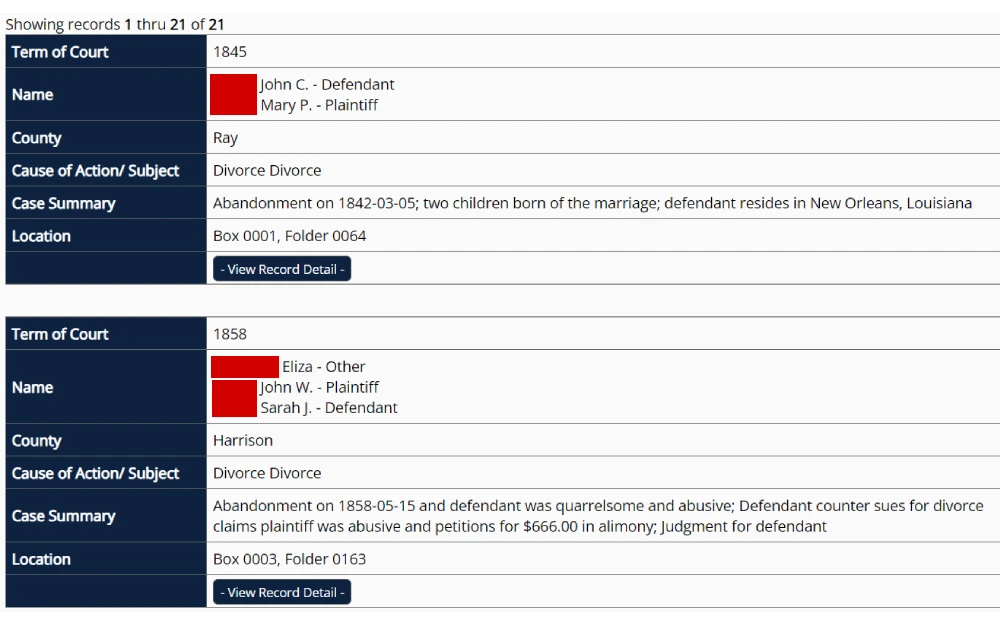
Furthermore, individuals can also look for these records in older newspapers or gather information surrounding divorces from senior family members. Inquirers can also look into church records, historical societies, or other religious institutions to collect information relating to marriages and divorces.
How To Look Up Dissolutions of Marriage & Common Law Divorce Records in MO
The state of Missouri in 1921 declared common law marriages null and void. This was done by legislating the Missouri Statute 451.040.14
Equally important is the fact that Missouri only acknowledges formal marriages; domestic partnerships and civil unions don’t hold ground here except for certain cities like St. Louis, which approve city-registered domestic partnerships.
However, due to the Full Faith & Credit Clause of the U.S. Constitution, the state of Missouri respects the validity of common law nuptials set up in other states where they are allowed legally.
Common law couples that want to end their marriage face similar procedures as those taken by normally married couples. Before someone from a common law marriage can officially marry again, they have to legally obtain a divorce first.
The state of Missouri doesn’t distinguish between the terms dissolution and divorce. To find the common law divorce records, individuals will need to contact the Bureau of Vital Records in Jefferson City and follow the steps outlined above.
How To Navigate the Missouri Divorce Process: Filing & Addressing Petitions
Missouri stands among a group of states that embrace no-fault divorce. This simplifies things to an extent, as it allows couples to file for divorce if they can effectively prove that their marriage is irretrievably broken.
The process of getting a divorce hinges on whether both parties come to an agreement regarding aspects such as child custody, alimony, and property division. If consensus remains elusive on these matters, it takes the form of a contested divorce.
The initial steps towards getting a divorce include obtaining necessary documents like the Petition for Dissolution of Marriage Form. This form must be filled by either spouse who has been a resident of Missouri for at least 90 days.
The next step involves pursuing a divorce, which is referred to as the service of process. Following filing the marriage dissolution petition, this is the formal procedure where an official notice is sent from the petitioner to the respondent telling the other about their intent to end the marriage. This critical document holds two key components: it contains a summons as well as a duplicate copy of the said petition.
Once the summons and the divorce papers reach their intended recipient, the one on the receiving end must promptly file an officially written response within 30 days, as mandated under Mo. Rev. Stat. § 452.305(1).15
During this period, the couple can also try to reconcile and enter into mediation or other alternative dispute resolutions. However, if differences remain irreconcilable, then courts will have to adjudicate on the matter.
After compiling all of the necessary paperwork, the case heads to court. This can include testimony from individuals or any supporting documents. After the judge hears everything, they will write an official approval for the annulment of marriage.
In Missouri, applicants can expect to spend around $130 to $200 on filing fees for divorce documents, but this varies from county to county so it’s advisable to check with the relevant clerk beforehand. Serving these documents adds another $25 on average, but costs can climb even further if litigation is pursued.
A contested divorce can cost anywhere between $4,000 and $29,000. These costs can climb even higher if property distribution, businesses, or even child custody is involved.
Once the divorce is finalized, it becomes part of the court and state records.
By following the above-mentioned processes, individuals can access these Missouri divorce records and gain informative insights; for other record types — such as births, deaths, warrants, inmates, background checks, and more — you can rely on the MO free public information lookup overview.
References
1Revisor of Missouri. (2004, August 8). Missouri Revisor of Statutes – Revised Statutes of Missouri, RSMo Section 610.010. Missouri Revisor of Statutes. Retrieved November 16, 2023, from <https://revisor.mo.gov/main/OneSection.aspx?section=610.010>
2Centers for Disease Control and Prevention. (n.d.). Missouri. CDC. Retrieved November 30, 2023, from <https://www.cdc.gov/nchs/pressroom/states/missouri/mo.htm#print>
3St. Louis County Circuit Clerk Department. (n.d.). Frequently Asked Questions. St. Louis County Courts. Retrieved November 16, 2023, from <https://stlcountycourts.com/services/circuit-clerk/frequently-asked-questions/>
4Missouri Courts (n.d.). Litigant Name Search. Name Search Result. Retrieved November 30, 2023, from <https://www.courts.mo.gov/cnet/nameSearchResult.do?courtType=SW&countyCode=&newSearch=Y&essn=&courtCode=SW&lastName=smith&_inclAlias=on&firstName=john&middleName=&caseType=Family%2FDomestic&yearFiled=>
5Crowder, C. (n.d.). Circuit Clerk | St Charles County, MO – Official Website. St. Charles County. Retrieved November 16, 2023, from <https://www.sccmo.org/343/Circuit-Clerk>
6Circuit Court of Missouri. (2023, April 24). Record Request. Retrieved November 30, 2023, from <https://www.kcmo.gov/home/showpublisheddocument/2462/638180390325970000>
7VitalChek. (n.d.). Missouri Divorce Record. VitalChek. Retrieved November 16, 2023, from <https://www.vitalchek.com/v/divorce-records/missouri>
8Greene County, Missouri Circuit Clerk’s Office. (n.d.). Request For Records or Copies. Greene County, Missouri Circuit Clerk’s Office. Retrieved November 16, 2023, from <https://static1.squarespace.com/static/55a40363e4b091f90ab8e94f/t/630f94c540a06b4e5bfaaad4/1661965509815/Copy-Record++REQUEST+FORM.pdf>
9Ashcroft, J. R. (n.d.). Local Records Inventory Database. Missouri Secretary of State. Retrieved November 16, 2023, from <https://s1.sos.mo.gov/records/archives/archivesdb/countyinventory/Default.aspx>
10Ashcroft, J. R. (n.d.). Create Request. Missouri Secretary of State. Retrieved November 16, 2023, from <https://s1.sos.mo.gov/Records/Archives/ResearchRequest/Request/Create>
11Ashcroft, J. R. (2016, May). Genealogical Request Form. Missouri Secretary of State. Retrieved November 16, 2023, from <https://www.sos.mo.gov/CMSImages/Archives/GENRESFM.pdf>
12Ashcroft, J. R. (n.d.). Missouri State Archives. Missouri Secretary of State. Retrieved November 16, 2023, from <https://s1.sos.mo.gov/records/archives/archivesdb/judicialrecords/>
13Ashcroft, J. R. (n.d.). Missouri Judicial Records Historical Database. Missouri Secretary of State. Retrieved November 16, 2023, from <https://s1.sos.mo.gov/records/archives/archivesdb/judicialrecords/>
14Missouri Revisor of Statutes. (2021, August 28). Missouri Revisor of Statutes – Revised Statutes of Missouri, RSMo Section 451.040. Missouri Revisor of Statutes. Retrieved November 16, 2023, from <https://revisor.mo.gov/main/OneSection.aspx?section=451.040>
15Missouri Revisor of Statutes. (2009, August 28). Missouri Revisor of Statutes – Revised Statutes of Missouri, RSMo Section 452.305. Missouri Revisor of Statutes. Retrieved November 16, 2023, from <https://revisor.mo.gov/main/OneSection.aspx?section=452.305>
